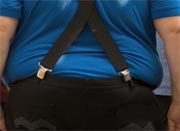
MONDAY, Nov. 5 (HealthDay News) — Overweight or obese people who lose weight through a low-carb or low-fat diet can also significantly reduce inflammation throughout their body, which could help lower risks for heart disease, a new study says.
“Our findings indicate that you can reduce systemic inflammation, and possibly lower your risk of heart disease, no matter which diet — either low-carb or low-fat,” Kerry Stewart, director of clinical and research exercise physiology at Johns Hopkins University School of Medicine in Baltimore, said in a university news release. “The important factor is how much weight you lose — especially belly fat.”
Since fat cells secrete molecules that increase inflammation into the bloodstream, people who are overweight or obese are at greater risk for inflammation throughout their body, the researchers explained. They noted such widespread inflammation also raises the risk of heart attack and stroke.
The study involved 60 people, ranging in age from 30 to 65, who were overweight or obese with a large amount of fat around their waistline. The participants were told to follow either a low-carb diet or a low-fat diet for six months. Both groups also exercised three times a week.
At the beginning and end of the study, the participants were weighed; their body-mass index(BMI) and total body and belly fat were measured, and the researchers took blood samples to measure three common markers of inflammation.
Everyone in the study had a roughly 20 percent increase in aerobic fitness. The people on the low-carb diet, however, lost more weight. On average, they shed 28 pounds compared to an average loss of 18 pounds for those on the low-fat diet.
The study also showed the low-carb group had a more significant drop in BMI and belly fat.
Despite that finding, both diets helped reduce inflammation.
“In both groups, there was a significant drop in the levels of all three measures of inflammation,” Stewart said.
The findings were to be presented Monday at the American Heart Association annual meeting in Los Angeles.
Research presented at medical meetings should be viewed as preliminary until published in a peer-reviewed journal.
More information
The U.S. Centers for Disease Control and Prevention has more on the benefits of weight loss.

